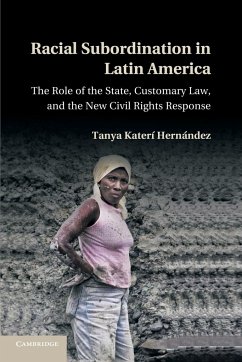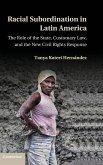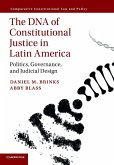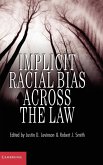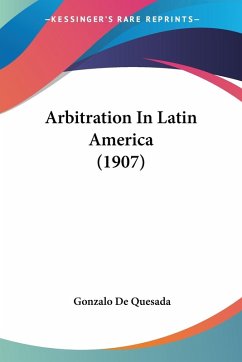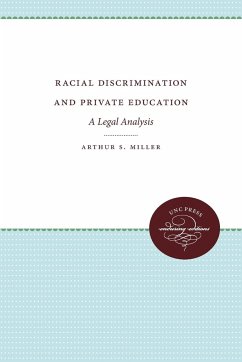Tanya Kateri Hernandez
Racial Subordination in Latin America
The Role of the State, Customary Law, and the New Civil Rights Response
Tanya Kateri Hernandez
Racial Subordination in Latin America
The Role of the State, Customary Law, and the New Civil Rights Response
- Broschiertes Buch
- Merkliste
- Auf die Merkliste
- Bewerten Bewerten
- Teilen
- Produkt teilen
- Produkterinnerung
- Produkterinnerung
This book examines customary laws of racial regulation and the historic complicity of Latin American states in erecting and sustaining racial hierarchies.
Andere Kunden interessierten sich auch für
![Racial Subordination in Latin America Racial Subordination in Latin America]() Tanya Katerai HernaandezRacial Subordination in Latin America112,99 €
Tanya Katerai HernaandezRacial Subordination in Latin America112,99 €![The DNA of Constitutional Justice in Latin America The DNA of Constitutional Justice in Latin America]() Daniel M. Brinks (Austin University of Texas)The DNA of Constitutional Justice in Latin America40,99 €
Daniel M. Brinks (Austin University of Texas)The DNA of Constitutional Justice in Latin America40,99 €![Implicit Racial Bias Across the Law Implicit Racial Bias Across the Law]() Implicit Racial Bias Across the Law107,99 €
Implicit Racial Bias Across the Law107,99 €![Arbitration In Latin America (1907) Arbitration In Latin America (1907)]() Gonzalo De QuesadaArbitration In Latin America (1907)27,99 €
Gonzalo De QuesadaArbitration In Latin America (1907)27,99 €![Environmental Justice in Latin America Environmental Justice in Latin America]() Environmental Justice in Latin America38,99 €
Environmental Justice in Latin America38,99 €![Marine and Fisheries Policies in Latin America Marine and Fisheries Policies in Latin America]() Marine and Fisheries Policies in Latin America66,99 €
Marine and Fisheries Policies in Latin America66,99 €![Racial Discrimination and Private Education Racial Discrimination and Private Education]() Arthur S. MillerRacial Discrimination and Private Education46,99 €
Arthur S. MillerRacial Discrimination and Private Education46,99 €-
-
-
This book examines customary laws of racial regulation and the historic complicity of Latin American states in erecting and sustaining racial hierarchies.
Hinweis: Dieser Artikel kann nur an eine deutsche Lieferadresse ausgeliefert werden.
Hinweis: Dieser Artikel kann nur an eine deutsche Lieferadresse ausgeliefert werden.
Produktdetails
- Produktdetails
- Verlag: Cambridge University Press
- Seitenzahl: 258
- Erscheinungstermin: 30. September 2013
- Englisch
- Abmessung: 229mm x 152mm x 14mm
- Gewicht: 379g
- ISBN-13: 9781107695436
- ISBN-10: 1107695430
- Artikelnr.: 40339880
- Herstellerkennzeichnung
- Libri GmbH
- Europaallee 1
- 36244 Bad Hersfeld
- gpsr@libri.de
- Verlag: Cambridge University Press
- Seitenzahl: 258
- Erscheinungstermin: 30. September 2013
- Englisch
- Abmessung: 229mm x 152mm x 14mm
- Gewicht: 379g
- ISBN-13: 9781107695436
- ISBN-10: 1107695430
- Artikelnr.: 40339880
- Herstellerkennzeichnung
- Libri GmbH
- Europaallee 1
- 36244 Bad Hersfeld
- gpsr@libri.de
Tanya Katerí Hernández is a Professor of Law at Fordham University School of Law, where she teaches comparative employment discrimination, critical race theory, and trusts and estates. She received her AB from Brown University and her JD from Yale Law School, where she served as Note Topics Editor of the Yale Law Journal. Professor Hernández has been awarded a Non-Resident Faculty Fellowship at the Fred T. Korematsu Center for Law and Equality for 2011-13. She has previously served as a Law and Public Policy Affairs Fellow at Princeton University, a Faculty Fellow at the Institute for Research on Women at Rutgers University, and as an Independent Scholar in Residence at the Schomburg Center for Research in Black Culture. In 2011, Professor Hernández was named a Fellow of the American Bar Foundation, and in 2009 she was elected to the American Law Institute. Hispanic Business magazine selected her as one of the 100 Most Influential Hispanics of 2007. Professor Hernández serves on the editorial boards of the Journal of Legal Education, and the Latino Studies Journal published by Palgrave-Macmillian. Professor Hernández's scholarly interest is in the study of comparative race relations and anti-discrimination law, and her work in that area has been published in the California Law Review, Cornell Law Review, Harvard Civil Rights-Civil Liberties Law Review, and the Yale Law Journal amongst other publications.
1. Racial innocence and the customary law of race regulation; 2. Spanish
America whitening the race - the un(written) laws of 'blanqueamiento' and
'mestizaje'; 3. Brazilian 'Jim Crow': the immigration law whitening project
and the customary law of racial segregation - a case study; 4. The social
exclusion of Afro-descendants in Latin America today; 5. Afro-descendant
social justice movements and the new anti-discrimination laws; 6. Brazil:
at the forefront of Latin American race-based affirmative action policies
and census racial data collection; 7. Conclusion: the United States-Latin
America connections.
America whitening the race - the un(written) laws of 'blanqueamiento' and
'mestizaje'; 3. Brazilian 'Jim Crow': the immigration law whitening project
and the customary law of racial segregation - a case study; 4. The social
exclusion of Afro-descendants in Latin America today; 5. Afro-descendant
social justice movements and the new anti-discrimination laws; 6. Brazil:
at the forefront of Latin American race-based affirmative action policies
and census racial data collection; 7. Conclusion: the United States-Latin
America connections.
1. Racial innocence and the customary law of race regulation; 2. Spanish
America whitening the race - the un(written) laws of 'blanqueamiento' and
'mestizaje'; 3. Brazilian 'Jim Crow': the immigration law whitening project
and the customary law of racial segregation - a case study; 4. The social
exclusion of Afro-descendants in Latin America today; 5. Afro-descendant
social justice movements and the new anti-discrimination laws; 6. Brazil:
at the forefront of Latin American race-based affirmative action policies
and census racial data collection; 7. Conclusion: the United States-Latin
America connections.
America whitening the race - the un(written) laws of 'blanqueamiento' and
'mestizaje'; 3. Brazilian 'Jim Crow': the immigration law whitening project
and the customary law of racial segregation - a case study; 4. The social
exclusion of Afro-descendants in Latin America today; 5. Afro-descendant
social justice movements and the new anti-discrimination laws; 6. Brazil:
at the forefront of Latin American race-based affirmative action policies
and census racial data collection; 7. Conclusion: the United States-Latin
America connections.

